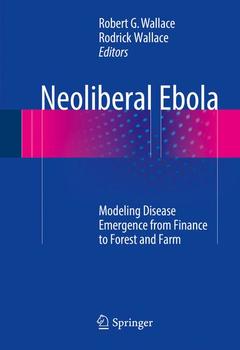Description
Neoliberal Ebola, Softcover reprint of the original 1st ed. 2016
Modeling Disease Emergence from Finance to Forest and Farm
Coordinators: Wallace Robert G., Wallace Rodrick
Language: English
Subject for Neoliberal Ebola:
Keywords
Pandemic; Mathematical Models; vaccine; biology; Africa; epidemic; Systems Biology
Publication date: 09-2016
Support: Print on demand
Publication date: 06-2018
Support: Print on demand
Description
/li>Contents
/li>Biography
/li>Comment
/li>
Robert G. Wallace, PhD, is a public health phylogeographer presently visiting the University of Minnesota's Institute for Global Studies. His research has addressed the evolution and spread of influenza, the agroeconomics of Ebola, the social geography of HIV/AIDS in New York City, the emergence of Kaposi's sarcoma herpesvirus out of Ugandan prehistory, and the evolution of infection life history in response to antivirals. Wallace is co-author of Farming Human Pathogens: Ecological Resilience and Evolutionary Process (Springer). He has consulted for the Food and Agriculture Organization of the United Nations and the Centers for Disease Control and Prevention.
Rodrick Wallace, PhD, is a research scientist in the Division of Epidemiology of the New York State Psychiatric Institute at Columbia University. He received undergraduate and graduate degrees in mathematics and physics from Columbia, worked a decade as a public interest lobbyist, is a past recipient of an Investigator Award in Health Policy Research from the Robert Wood Johnson Foundation, and is the author of numerous books and papers on matters of public health and public order.
This volume was produced by a wide consortium representing a broad spectrum of scientific disciplines
The work presents an attempt to get ahead of a possible pandemic occurrence
The book expands the epistemological implications of the West African outbreak
Includes supplementary material: sn.pub/extras




